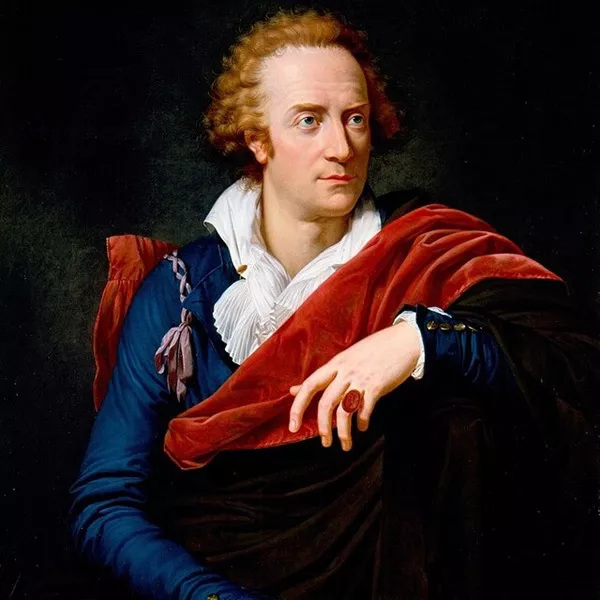
Vittorio Alfieri (1749–1803) was an Italian poet, playwright, and intellectual, renowned for his contributions to Italian literature during the 18th century. He was a significant figure of the Italian Enlightenment, blending classical themes with an impassioned pursuit of freedom and individualism. Alfieri’s works express his deep convictions about liberty, justice, and the human condition, influencing the course of Italian literary history.
Vittorio Alfieri Biography
Vittorio Alfieri was born on January 16, 1749, in Asti, a small town in the Piedmont region of Italy. Born into an aristocratic family, Alfieri enjoyed a privileged childhood but was greatly influenced by the strict and oppressive nature of his upbringing. This led him to rebel early on, developing a strong sense of independence and self-determination. His early education, though somewhat conventional, was shaped by his father’s demanding expectations. Alfieri’s desire for freedom grew, and he became increasingly drawn to the works of classical authors like Sophocles, Euripides, and Horace, whose emphasis on personal freedom and tragedy deeply resonated with him.
At the age of 20, Alfieri left Italy for a tour across Europe, spending time in England, France, and Spain. This journey not only broadened his intellectual horizons but also solidified his disdain for the rigid structures of his home country. In Paris, he came into contact with the revolutionary ideals that were stirring Europe at the time. The political climate of the Enlightenment profoundly influenced Alfieri’s worldview, fostering a desire to express his ideals of liberty, democracy, and individual rights through his writings.
His poetic career began in earnest in the 1770s. While his early works were largely inspired by classical models, Alfieri’s later works became infused with a fervent nationalism and passion for Italy’s independence. His poetry, much like his personal life, was often marked by intense emotions, a disdain for tyranny, and a deep commitment to moral and intellectual freedom. His plays, particularly Saul and Mirra, dealt with tragic themes of individual conflict and societal constraints.
Alfieri’s works also reflect his philosophical views. He was not only a poet and playwright but also a thinker who wrote extensively on topics such as politics, history, and human nature. His treatise Della tirannide (On Tyranny) is an example of his deep engagement with the political climate of his time, advocating for the overthrow of tyrannical rule in favor of more just systems of governance.
Though Alfieri’s life was marked by personal hardships, including a series of tumultuous love affairs and a constant internal conflict, he remained committed to his intellectual pursuits. He returned to Italy in 1787, where he focused on writing and producing his dramatic works. His tragedies often reflected his struggles with the constraints of society, and his works were often critical of both the political and cultural establishments.
Vittorio Alfieri died on October 8, 1803, at the age of 54, leaving behind a legacy of profound influence on Italian literature and European thought. His contributions to literature, particularly his tragedies, played a significant role in the development of Italian theater, paving the way for the Romantic movement that followed.
Vittorio Alfieri Poems
Vittorio Alfieri Quotes
1. “Freedom is the breath of life for nations.”
2. “The tyrant rules not by strength, but by fear.”
3. “Injustice is the enemy of the soul.”
4. “To love liberty is to choose life over servitude.”
5. “Man’s greatest enemy is not his conqueror, but his own cowaredice.
6. “The truth is often buried beneath the weight of power.”
7. “Honor is not inherited, it is earned.”
8. “Courage does not lie in physical strength, but in the will to resist oppression.
9. “A nation’s greatness is defined by the freedom of its pedpple.
10. “The struggle for justice is never futile, even if the victory is deelayed.
Vittorio Alfieri Facts
1. Vittorio Alfieri was born into a noble family in Asti, Italy,in 1749.
2. He spent significant time in France, England, and Spain, wherehe was influenced by Enlightenment ideals.
3. Alfieri’s first major work, Della tirannide (On Tyranny), reeflects his passionate opposition to absolute monarchy.
4. Alfieri is regarded as one of the founders of the Italian RRomantic movement
5. His most famous tragedies, including Saul and Mirra, weere inspired by Greek drama and focus on themes of power, justice, and personal struggle.
6. He was known for his intense emotional expression and commitment to moral freedom.
7. Alfieri was a prolific writer, with numerous tragedies, podems, and political essays to his name.
8. He had a turbulent personal life, including several love aaffairs that influenced his writing.
9. Alfieri died in 1803 at the age of 54, leaving behind a leggacy as one of Italy’s foremost literary figures.
10. His works continue to be studied and admired for theirpolitical insights, emotional depth, and philosophical themes.
